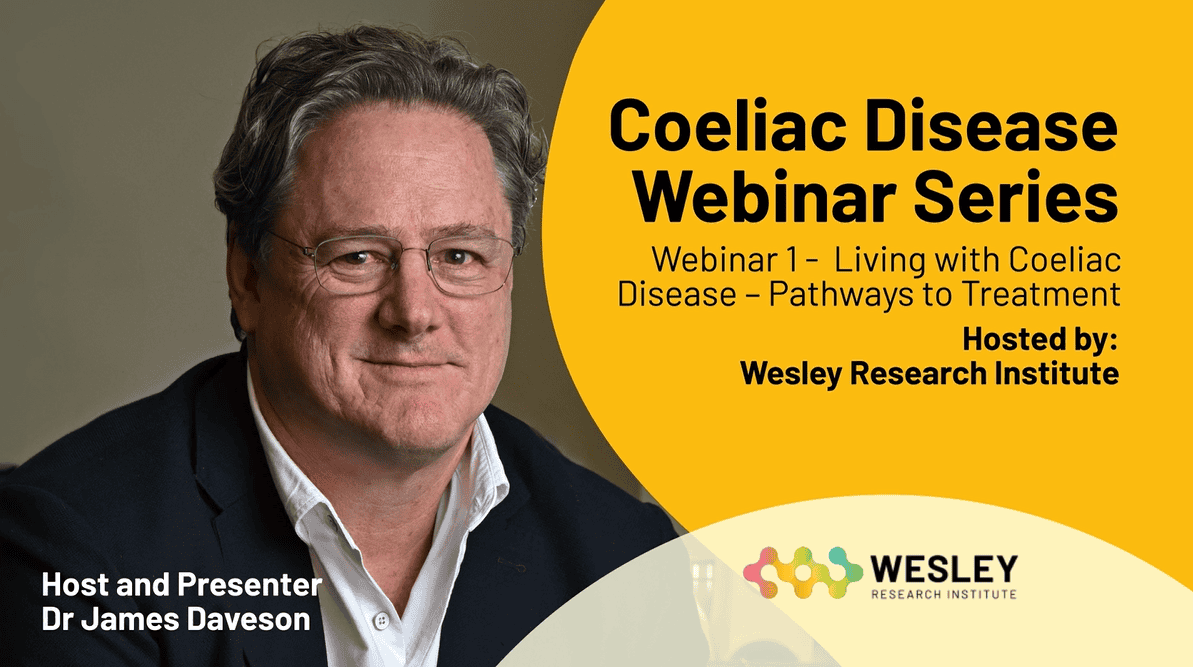
Wesley Research Institute’s inaugural Coeliac Disease Webinar Series has been met with an overwhelming response, with more than 1,200 registrants eager to gain insights into the latest research and emerging treatments for coeliac disease.
The two-session event – one tailored for individuals living with coeliac disease and the other for clinicians – featured leading experts Dr James Daveson, Clinical Director of the Coeliac Research and Immune Health Program at Wesley Research Institute, and Dr Jason W. Chien, Chief Medical Officer at Mozart Therapeutics.
Dr Daveson set the stage for the discussions, explaining the need for new treatment options beyond the gluten-free diet.
“We need a treatment because the gluten-free diet alone is insufficient,” he told the audience. “Many patients continue to experience ongoing symptoms and long-term health complications despite strict adherence.”
Watch Webinar
Watch the Coeliac Disease Webinar recording here – https://youtu.be/6y_EnIcwjO4
The Future of Treatment
Dr Chien introduced MTX 101, an innovative treatment under development at Mozart Therapeutics, which aims to restore immune tolerance by targeting pathogenic T cells involved in the immune response to gluten.
“In pre-clinical studies MTX 101 restores CD8 T regulatory function and helps eliminate the pathogenic CD4 T cells responsible for coeliac disease,” he said.
“This could be a game-changer in re-establishing immune balance.”
The discussion also highlighted the broader implications of MTX 101 for other autoimmune diseases, such as type 1 diabetes.
“If this approach proves effective in coeliac disease, it has potential applications across a wide spectrum of autoimmune conditions,” said Dr Chien.
Key Questions from the Community
The live Q&A session was a highlight, addressing pressing concerns from attendees –
✅ Why do we need treatments beyond the gluten-free diet?
Dr Daveson said – “Despite strict gluten avoidance, many patients continue to have ongoing symptoms and intestinal damage. The burden of a gluten-free diet is also significant, difficult to maintain particularly when eating out or travelling, is expensive and impacts social interactions, particularly in the young.”
✅ How close are we to an approved treatment?
Dr Chien said “We are currently in Phase 1 trials and will soon begin testing in coeliac patients. While drug development typically takes 10 to 15 years, advances in research and patient participation in trials could accelerate progress.”
✅ Will new treatments require a gluten challenge?
Dr Daveson said “Not all clinical trials require a gluten challenge. Some studies in coeliac disease focus more on blood tests using biomarkers like interleukin-2 levels to measure immune response instead.”
✅ Can this treatment reduce the risk of developing other autoimmune diseases?
Dr Chien said “Possibly, though we are yet to prove that. We believe this mechanism is universal across autoimmune diseases, so successful treatment in coeliac disease could potentially lower the risk of developing additional conditions.
✅ How can patients participate in clinical trials?
Dr Daveson said “Clinical trials rely on patient involvement. Those interested can join the Coeliac Research Network at Wesley Research Institute or visit clinicaltrials.gov to explore opportunities.”
What’s Next for Coeliac Disease Research?
Dr Daveson and Dr Chien both emphasised that research is rapidly advancing, and the next decade could bring significant changes in how coeliac disease is managed.
“We now have a much deeper understanding of the immune pathways involved in coeliac disease,” Dr Daveson said.
“With multiple promising treatments in development, we are entering an exciting era of targeted therapies.”
Wesley Research Institute is committed to keeping the coeliac community informed and engaged.
“We encourage anyone interested to follow our research, participate in trials and stay up to date with new developments through our Coeliac Research Network,” Dr Daveson said.
Stay tuned for future webinars and research updates as the journey towards better treatments for coeliac disease continues. Don’t miss out sign up for the next webinar.